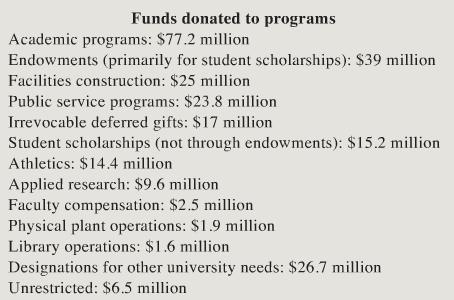Program donations on the rise in spite of poor economy

gifts::
February 17, 2010
Despite California’s poor economy, donations to the California State University system were strong for 2008-09.
In 2008-09, $366 million in charitable donations were given to the CSU system, according to a press release by the CSU system’s Public Affairs office. The amount donated was unexpected because of the negative economic climate.
“A down economy means people have less discretionary dollars for all uses, including donations,” said Erik Fallis, spokesman for the CSU chancellor. “These funds are crucial to success of the programs and purposes to which they are designated.”
The largest donations come from organizations such as corporations, foundations and charitable entities such as the United Way, Fallis said.
“Gift receipts from individuals totaled $116.5 million, with nearly a third of that coming from CSU alumni,” Fallis said.
A growing motivation for the donations came from donors trying to help university programs they were interested in from being hurt by the budget cuts.
Specific Interest funds are funds that are donated with an attached purpose, such as money for athletics or new instruments for the music program.
Unrestricted donations are important because they offset needs the university has where it doesn’t see many donations. Those funds are discretionary based on where the campus needs are not being met.
More than 38 percent of the individual totals of donations, or $44 million, came from CSU alumni and their various alumni membership dues also and donations according to the 2008-09 annual external support
“Grants and contracts play a significant role. For 2008-09 the CSU received $1.5 billion in operating grants and contracts revenue. Federal grants reported include student financial aid of $423 million in Pell Grants, $11.5 million in State Educational Opportunity Grants, and $16 million for work study programs,” Fallis said.
Specifically donating to Sacramento State is a different process than donating straight to a university. Often donations to specific universities come from some kind of relationship to the campus.
“Our efforts to engage our alumni, friends of the university, foundations and corporations in providing philanthropic support has truly paid off – as seen by the amount of private monies that have been raised in the last years,” said Associate Vice President of Development Vince Sales.
Besides the usual monetary donations, Sac State received many gifts in other forms, Sales said.
The works from Sac State alumnus Wayne Thiebaud were donated to the university, from an anonymous donor, and are valued at more than $1.38 million. The works are on display in the Library Gallery.
With the negative effects of furloughs and the harsh economic climate, donations to the universities are becoming increasingly important.
“Private donations are integral to pursue the “level of excellence’ that institutions require, creating a richer and more dynamic university,” Sales wrote in an e-mail.
One of Sac State’s biggest fundraising tools is the phone-a-thon. At the phone-a-thon, current Sac State students call alumni asking for pledges to the university.
“We have many alumni that still care about Sac State. Despite the down economy, they haven’t put us on the back burner,” said senior kinesiology major Shante Johnson, a student adviser to the phone-a-thon.
“What is a positive experience for me is being able to make a positive connection with an alumni and tell them how great the campus still is,” Johnson said.
The phone-a-thon has provided consistent fundraising for the last 10 years and there are many alumni who donate on a consistent basis every time they call, Johnson said. During the spring semester, the phone-a-thon focuses on calling alumni from each of the seven colleges, and all the money raised will be donated back to that department.
The impact of the economy on donations has yet to be determined, but early speculations don’t offer any promises of the 2009-10 year to be a repeat of the previous one.
“The recession continues to impact philanthropy in 2009-10,” Fallis said. “Most campuses are experiencing either further decline in giving or flat results for the current year.”
Cahil Bhanji can be reached at [email protected].













































































































































